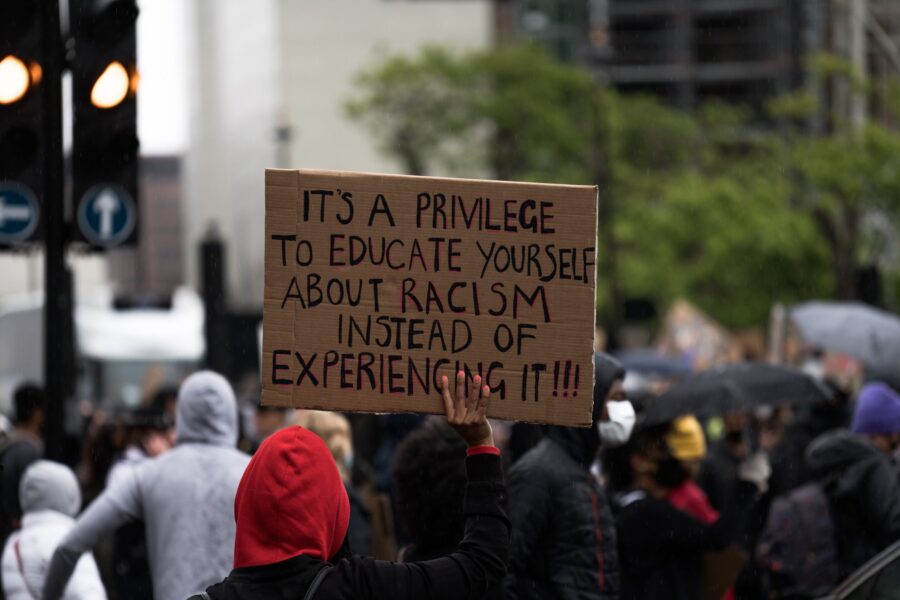Racial Trauma Permeates U.S. Two Years After Floyd Murder
“I just want to play basketball without fear of getting shot, I just want to live. I just want to be,” said a young Black man in Philadelphia participating in virtual group therapy offered by Black Men Heal. He is not alone.
An Associated Press article on the second anniversary of George Floyd’s death explored the fallout of that horrifying event. “A lot of our men report being overwhelmed, tired and feeling like they’re being attacked,” Black Men Heal co-founder Zakia Williams shared. “They see themselves in George Floyd. Each one of them says, ‘That could have been me.’”
It’s been two years since Floyd was murdered by a Minneapolis police officer on May 25, 2020, sparking a summer of protests and demands for a racial reckoning in America.
Floyd’s killing felt like the last straw for Black communities burdened by centuries of oppression and systemic racism. The AP article explains, “Mental health experts say the racism that causes the trauma is embedded in the country’s fabric and can be directly linked to the mental duress many experience today.”
Dr. Christine Crawford of the National Alliance on Mental Illness (NAMI) elaborates, “Continuously seeing these images of Black people being killed … can elicit trauma-like symptoms in Black people and others who feel somehow connected to what is going on.” The “impact of vicarious racism certainly has contributed to worsening mental health states, specifically within the Black community.”
The pandemic hit the Black community hard in some parts of the country, as lower-income individuals in cities like Detroit bore the brunt of economic hardship, and community elders lost their lives.
Then came Buffalo. On May 14, a white supremacist murdered 10 Black people at the Tops Friendly Market in a predominantly Black neighborhood in highly segregated Buffalo, New York. For many, it feels like trauma upon trauma, grief upon grief, “seeing people that look like our family” gunned down by an alleged domestic terrorist while doing their grocery shopping.
It’s not merely horrifying but loaded. As Rashad Robinson, president of the civil rights organization Color of Change, explains, “It is a set of circumstances that Black people and other communities that have been targeted, attacked and exploited, have to constantly face.” It’s “stressful and tiring” work to deal with the collective trauma while figuring out how to move forward to advocate for change and justice long overdue.
While the Black community has borne the brunt of the assault on mental health over the past few years, it is disproportionately underrepresented when it comes to receiving mental health services. Only 1 in 3 Black Americans receives the mental health help they need. According to the U.S. Department of Health and Human Services’ Office of Minority Health, those “living below the poverty line are more than twice as likely to report serious psychological distress as U.S. adults who enjoy greater financial security.” Black men in particular are not receiving support, as a 2021 study by the American Psychological Association found only 26% of Black men reporting daily anxiety or depression symptoms were likely to have used mental health services, compared with 45% of white men with the same feelings.
Enter Black Men Heal, created to address the chasm between mental health needs and mental health services. It pairs therapists of color with men who are given eight free individual therapy sessions. Almost 80% of participants continue with therapy after that point. It aims to create a positive ripple effect toward mental wellness. As COO Zakia Williams explains, “If one man can heal himself, he has the possibility of healing his household, which then has the possibility of healing our community.”
Mental health services are sorely needed, but so is social change. And everyone has a part to play.
Phylicia Brown, executive director of Black Love Resists in the Rust, argues that the white supremacy and racism that have been allowed to terrorize Black people throughout history must be dismantled. “Unless white people are checking themselves and one another, unless white people are organizing at the rate at which Black folks are organizing,” Brown said, “it will be very hard for us to experience freedom in this country.”
Stafford, Kat. “Two years after Floyd murder, racial trauma permeates US.” The Associated Press, 25 May 2022, https://apnews.com/article/death-of-george-floyd-covid-health-race-and-ethnicity-bf49acf236100d0f514f0ac8220c2240.
Photo by James Eades on Unsplash



